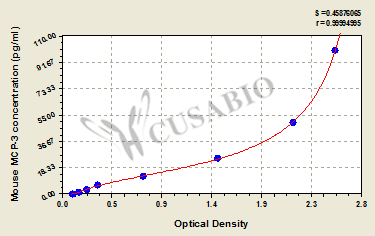| Code | CSB-E07426m |
| Size | 96T,5×96T,10×96T |
| Price | Request a Quote or Start an on-line Chat |
| Trial Size |
24T ELISA Kit Trial Size (Only USD$150/ kit) * The sample kit cost can be deducted from your subsequent orders of 96T full size kits of the same analyte at 1/5 per kit, until depleted in 6 months. Apply now |
| Intra-assay Precision (Precision within an assay): CV%<8% | ||||||
| Three samples of known concentration were tested twenty times on one plate to assess. | ||||||
| Inter-assay Precision (Precision between assays): CV%<10% | ||||||
| Three samples of known concentration were tested in twenty assays to assess. | ||||||
| To assess the linearity of the assay, samples were spiked with high concentrations of mouse MCP-3 in various matrices and diluted with the Sample Diluent to produce samples with values within the dynamic range of the assay. | ||||||
| Sample | Serum(n=4) | |||||
| 1:1 | Average % | 95 | ||||
| Range % | 86-99 | |||||
| 1:2 | Average % | 97 | ||||
| Range % | 90-101 | |||||
| 1:4 | Average % | 93 | ||||
| Range % | 85-96 | |||||
| 1:8 | Average % | 97 | ||||
| Range % | 92-101 | |||||
| The recovery of mouse MCP-3 spiked to levels throughout the range of the assay in various matrices was evaluated. Samples were diluted prior to assay as directed in the Sample Preparation section. | ||||||
| Sample Type | Average % Recovery | Range | ||||
| Serum (n=5) | 88 | 84-92 | ||||
| EDTA plasma (n=4) | 100 | 91-104 | ||||
| These standard curves are provided for demonstration only. A standard curve should be generated for each set of samples assayed. | |||||||||||||||||||||||||||||||||||||||||||||||||||||||||||||||

|
|||||||||||||||||||||||||||||||||||||||||||||||||||||||||||||||
CUSABIO's mouse MCP-3 ELISA kit is an in vitro enzyme-linked immunosorbent assay for the quantitative measurement of mouse MCP-3 in serum, plasma, or tissue homogenates. This assay uses the sandwich enzyme immunoassay technique in combination with the enzyme-substrate chromogenic reaction to quantify the analyte in the sample. The color develops positively to the amount of MCP-3 in samples. The color intensity is measured at 450 nm via a microplate reader.
MCP-3, also called CCL7, is a chemotactic factor and attractant for various kinds of leukocytes, including monocytes and neutrophils. CCL7 is involved in anti-inflammatory responses through binding to its chemokine receptors CCR1, CCR2, CCR3, and CCR5 to mediate the recruitment of immune cells. Abnormal CCL7 expression is related to certain immune diseases. Furthermore, CCL7 plays a pivotal role in tumorigenesis. CCL7 promotes tumor progression by supporting the formation of the tumor microenvironment (TME) and facilitating tumor invasion and metastasis.
There are currently no reviews for this product.